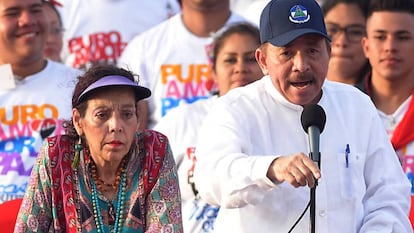US trade office launches probe into abuses by Daniel Ortega and Rosario Murillo regime in Nicaragua
The Biden administration announces it will investigate human and labor rights violations, opening door to a suspension from the CAFTA-DR free trade agreement


With just over a month to go before he leaves the White House, President Joe Biden has launched what could be described as his administration’s last measure to pressure the regime of Daniel Ortega and Rosario Murillo: the opening of an investigation by the Office of the United States Trade Representative (USTR) into “Nicaragua’s acts, policies, and practices related to labor rights, human rights, and the rule of law.” The most relevant aspect of this investigation is its scope, as it opens the door to suspending Nicaragua from the free trade agreement between the United States, Central America and the Dominican Republic (CAFTA-DR), one of the key economic drivers of the Central American country.
The United States Trade Representative, Katherine Tai, said in a statement that the investigation will be conducted “under Section 301 of the Trade Act of 1974, as amended.” This regulation authorizes the American president to take all appropriate measures, including tariff-based and non-tariff-based retaliation, to address any unfair act, policy, or practice of a foreign government that burdens or restricts U.S. commerce.
The United States is Nicaragua’s main trading partner, far ahead of China, with which the Sandinista regime signed another free trade agreement at the end of 2023. The North American market represents 30% of Nicaragua’s imports and is the destination of 55% of its exports, thanks in part to the CAFTA-DR treaty.
Since the escalation of political repression in 2018, the suspension of Nicaragua from the free trade agreement, vital for the country’s economy, has always been on the table of the lobby that is critical of the Sandinista administration, but until now it had been met with reluctance due to its economic implications. So the debate in Washington had focused not on suspending Nicaragua, but on how to exert effective pressure on labor, environmental and business violations of the treaty.
However, this new U.S. investigation raises the possibility of applying penalties or fines, despite pressure from companies not to do so, and even of reimposing tariffs on certain goods. “It could also lead to a temporary suspension of the CAFTA-DR free trade agreement, or renegotiating the agreement separately. The justification is broad and not restricted to labor rights,” Manuel Orozco, a researcher at the Inter-American Dialogue and one of the greatest experts on Washington’s policy toward Nicaragua, explains to EL PAÍS.
“A burden on American commerce”
The statement released by the Biden Administration on December 10 states that “the United States is concerned that Nicaragua is engaging in repressive and persistent attacks on labor rights, human rights, and the rule of law.”
“The investigation initiated today is the first under Section 301 to investigate acts, policies, and practices that may violate labor rights, human rights, and dismantle the rule of law that may burden U.S. commerce, and complements a range of actions the United States is taking to mark International Human Rights Day today,” said United States Trade Representative Katherine Tai in the statement.
The document also notes that “numerous credible reports by the U.S. Government, as well as the United Nations Office of the High Commissioner for Human Rights, the Inter-American Commission on Human Rights, the International Labor Organization and the UN Group of Human Rights Experts on Nicaragua, document that the Ortega-Murillo regime in Nicaragua engages in labor rights and human rights violations and dismantling of the rule of law.”
“The Biden-Harris Administration is firmly committed to a worker-centered trade policy to ensure our trade partnerships drive a race to the top for all workers and people,” said Thai. “Unfortunately, numerous reports suggest the Government of Nicaragua is engaging in repressive acts that harm Nicaragua’s own workers and people, undermine fair competition, and destabilize our region. USTR will thoroughly investigate the alleged violations of labor rights and human rights, and dismantling of the rule of law.”
The treaty known as CAFTA-DR was designed to promote trade by gradually eliminating tariff barriers and by providing dispute resolution mechanisms between companies and States. The treaty also includes two legal compliance provisions regarding labor and environmental rights, in which the signatory parties commit to respect these rights as part of the implementation of the agreement.
“Legally, no State can expel another for non-compliance, but a State can challenge another for any violation or decide to withdraw or renegotiate the agreement,” says Orozco. “Also, according to an article taken from international regulations, a State cannot abstain from taking measures against another if this affects the national interest. This last decision is unilateral and rarely used by the United States. However, fines or other commercial penalties have been common practice in the United States. This last aspect is one that applies directly to the case of Nicaragua given the non-compliance with the agreement in several aspects, including labor and environmental matters.”
Sign up for our weekly newsletter to get more English-language news coverage from EL PAÍS USA Edition
Tu suscripción se está usando en otro dispositivo
¿Quieres añadir otro usuario a tu suscripción?
Si continúas leyendo en este dispositivo, no se podrá leer en el otro.
FlechaTu suscripción se está usando en otro dispositivo y solo puedes acceder a EL PAÍS desde un dispositivo a la vez.
Si quieres compartir tu cuenta, cambia tu suscripción a la modalidad Premium, así podrás añadir otro usuario. Cada uno accederá con su propia cuenta de email, lo que os permitirá personalizar vuestra experiencia en EL PAÍS.
¿Tienes una suscripción de empresa? Accede aquí para contratar más cuentas.
En el caso de no saber quién está usando tu cuenta, te recomendamos cambiar tu contraseña aquí.
Si decides continuar compartiendo tu cuenta, este mensaje se mostrará en tu dispositivo y en el de la otra persona que está usando tu cuenta de forma indefinida, afectando a tu experiencia de lectura. Puedes consultar aquí los términos y condiciones de la suscripción digital.








































